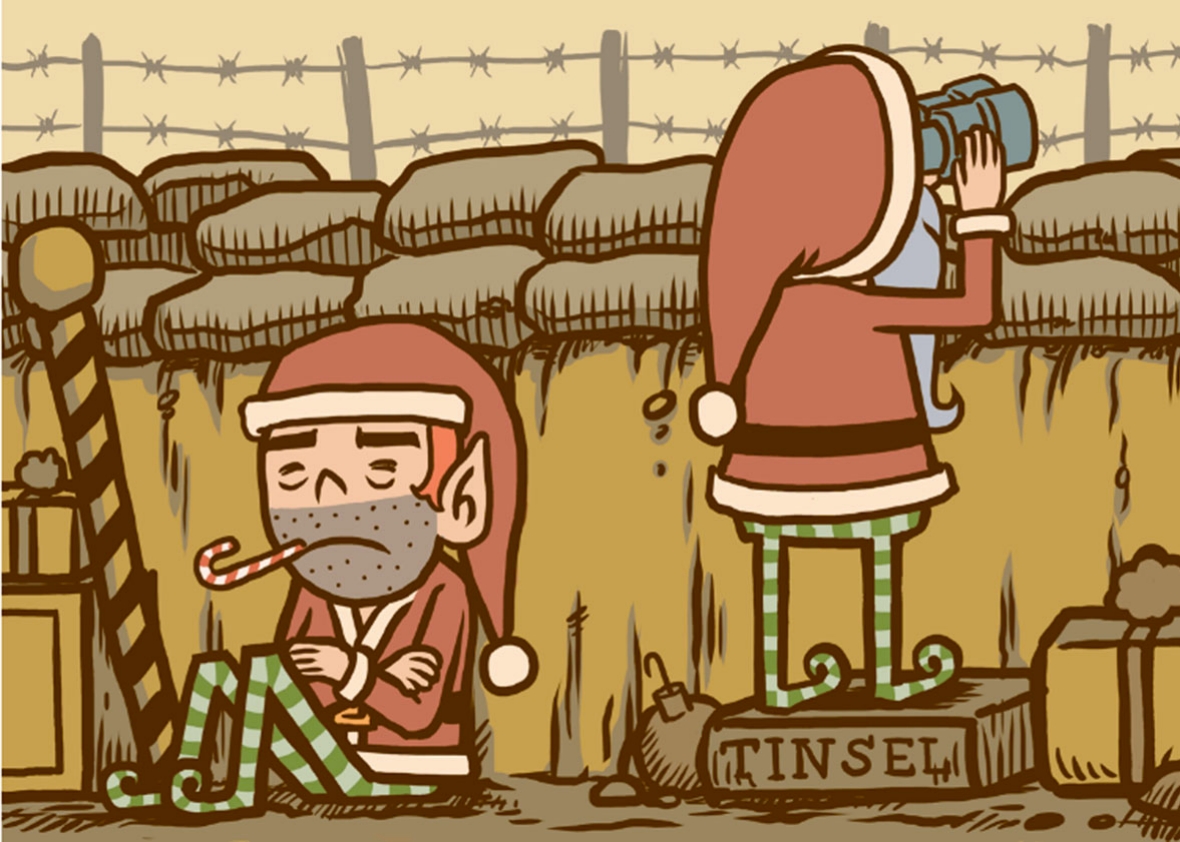
- Goose
- Cogito ergo sum
 Offline
Offline 
- Registered: 1/29/2015
- Posts: 13,427
2,000 Years of Fighting About Christmas
Two-Thousand Years of Grinches
Hand-wringing over Christmas has been going on since the Christ child left the manger.
By Ruth Graham
I don’t know if you’ve heard, but the real meaning of Christmas has been sadly overtaken by wanton capitalism in recent years. “This festival teaches even the little children, artless and simple, to be greedy,” as one critic put it. “The tender minds of the young begin to be impressed with that which is commercial and sordid.”
The year was 400, and the anxious writer was the Cappadocian Bishop Asterius of Amasea. Asterius’ pious fretting is quoted in Canadian historian Gerry Bowler’s Christmas in the Crosshairs: Two Thousand Years of Denouncing and Defending the World’s Most Celebrated Holiday, which makes clear that hand-wringing over the correct way to celebrate the Christ child started practically before the kid left the manger.
The refreshing takeaway of Christmas in the Crosshairs is that most contemporary agita about Christmas’ supposed decline is misplaced. The commercialization of Christmas isn’t a recent development; St. Augustine was pleading with people to give alms instead of holiday gifts in the early fifth century. The supposed erasure of Christ from Christmas isn’t new, either; devout killjoys have forever lamented the season’s secular revelry. And the “war on Christmas” has been enlisting troops for centuries; in Communist Russia, Christmas trees were banned, and children were told their gifts came from Stalin, not Santa. Despite all these obstacles, Christmas is now, Bowler announces, “the biggest single event on the planet.”
The one moment in history that Christmas seemed truly imperiled was the early 19th century, when celebrations in the United States and parts of Europe had become rowdy, violent affairs. Yuletide wildness distasteful to the upper classes was an old phenomenon. But now gangs of men and boys would roam the streets drinking, vandalizing property, throwing firecrackers, and even invading homes. In New York in 1828, soon after Andrew Jackson’s election had prompted fears of “mobocracy,” lower-class revelers wassailed their way down the Bowery with drums and whistles, shouted outside a fancy-dress ball, and ended the evening by smashing up a black church and chasing worshipers through the streets. It took mythologizers such as Charles Dickens, whose A Christmas Carol was published in 1843, to drag Christmas from the streets into the parlor. In the late 19th century, the holiday began to take on its contemporary shape as an idealized season of family warmth rather than one of drunken partying.
Today, Christmas’ status as both a religious holiday and a time for private gift-giving and merriment is more than secure. Once again the question is what the holiday should look like in the public square. Bowler traces the modern American “war” on Christmas to 1905, when a group of Jewish Brooklynites became exasperated with yuletide evangelizing in a public school. When the principal told students at a December assembly to be “more Christlike,” the fed-up parents called for his ouster. The Board of Education refused, and dissenters spent the next year agitating for their cause, including the removal of the Christmas tree. The next year, many removed their children from participating in holiday ceremonies, and school authorities agreed to forgo explicitly religious celebrations. The parents won the battle, but the war had just begun. By midcentury, disputes about how schools and local governments should mark the holiday increasingly took place in the courtroom and from there became fodder for the culture wars.
Social histories of Christmas are a well-worn genre, but Bowler, previously the author of Santa Claus: A Biography, is a lively guide. His focus on combat gives his account narrative zip, and it doesn’t hurt that he covers two millennia in fewer than 250 pages. But as Christmas in the Crosshairs marches forward to the modern era, it becomes clear that Bowler is not just a war correspondent but a combatant. He puts “progressive” in scare quotes and sneers at the “delicacy towards the feelings of others” that has led to minor local disputes over, say, distributing “Merry Christmas” goodie bags at a veterans hospital. Occasionally his scorn is well-placed—he correctly pegs many New Atheist diatribes as humorless—but elsewhere he wastes time shooting at small targets. “Snowmen have long been deemed to be part of the holiday season, but have you considered their contribution to the sum total of racism and sexism in the world?” he jeers. “Professor Patricia Cusack, an art historian of Birmingham University, has.” (It’s Tricia Cusack, it’s the University of Birmingham, and the paper Bowler goes on to mock seems admittedly silly but hardly worth the firepower.)
It’s worth slogging through Bowler’s sarcasm and disdain, however, to get to anecdotes like the one about Nazi schoolchildren singing a version of “Silent Night” that included these lyrics:
Silent night, Holy night,
All is calm, all is bright.
Adolf Hitler is Germany’s star
Showing us greatness and glory afar
Bringing us Germans the might.
But a more serious problem is that Bowler misses an opportunity to look critically at contemporary conservative paranoia about the war on Christmas. By the time the reader gets to the present day, she is trudging through pages upon pages in which almost the only sources cited are Fox News, National Review, and other noble muckrakers. But it would be nice to see deeper analysis of why reporting on local officials who dare to call a tinsel-decked fir in the town square a “holiday tree” resonates with news consumers.
Fox’s Bill O’Reilly declared victory in the war on Christmas in 2014, noting that for the first time in recent memory, no stores had instructed their employees not to say “Merry Christmas” to customers. Phew!
But just as hostilities seemed to be dying down, Donald Trump revived them. “If I become president, we’re gonna be saying Merry Christmas at every store,” he told Iowans last year. “You can leave ‘happy holidays’ at the corner.” The promise became a staple of his stump speech. It all seemed so harmless for a while, didn’t it? But Bowler’s book is a timely reminder that progressives should be paying more attention to the fear many conservatives feel that their culture is slipping away from them. As frivolous as the war on Christmas may seem, once in a while it has casualties.
Last edited by Goose (12/06/2016 8:50 am)
We live in a time in which decent and otherwise sensible people are surrendering too easily to the hectoring of morons or extremists.
- tennyson
- Exchanger
 Offline
Offline 
- Registered: 2/06/2015
- Posts: 6,654
Re: 2,000 Years of Fighting About Christmas
I never cared about what people said in stores. It is kind of not important. The important thing is that we call all celebrate the season in the religious denomination (or not) of our choice. THAT is the important thing. That we have the freedom from (and of) religion.
"Do not confuse motion and progress, A rocking horse keeps moving but does not make any progress"
- Goose
- Cogito ergo sum
 Offline
Offline 
- Registered: 1/29/2015
- Posts: 13,427
Re: 2,000 Years of Fighting About Christmas
From 1659 to 1681, showcasing one's holiday spirit in Boston could cost you a fine of as much as five shillings. That's right — Christmas used to be illegal. It's somewhat surprising, then, that the same puritanical minds also created the first American batch of eggnog at Captain John Smith's 1607 Jamestown settlement. (The word nog comes from the word grog; that is, any drink made with rum.) Christmas was so inconsequential in early America that after the Revolutionary War, Congress didn't even bother taking the day off to celebrate the holiday, deciding instead to hold its first session on Christmas Day, 1789. It took almost a century for Congress to proclaim it a federal holiday.
All Christmas activities, including dancing, seasonal plays, games, singing carols, cheerful celebration and especially drinking were banned by the Puritan-dominated Parliament of England in 1644, with the Puritans of New England following suit. Christmas was outlawed in Boston, and the Plymouth colony made celebrating Christmas a criminal offense, according to "Once Upon a Gospel" (Twenty-Third Publications, 2008).
Christmas trees and decorations were considered to be unholy pagan rituals, and the Puritans also banned traditional Christmas foods such as mince pies and pudding. Puritan laws required that stores and businesses remain open all day on Christmas, and town criers walked through the streets on Christmas Eve calling out "No Christmas, no Christmas!"
Last edited by Goose (12/06/2016 12:56 pm)
We live in a time in which decent and otherwise sensible people are surrendering too easily to the hectoring of morons or extremists.
- •
- Tropicalfox
- Exchanger
 Offline
Offline 
- Registered: 2/01/2015
- Posts: 124
Re: 2,000 Years of Fighting About Christmas
Christmas = Coquito
- Goose
- Cogito ergo sum
 Offline
Offline 
- Registered: 1/29/2015
- Posts: 13,427
Re: 2,000 Years of Fighting About Christmas
Tropicalfox wrote:
Christmas = Coquito
[img],h_416,c_fit,fl_progressive,q_95/v1/img/recipes/48/79/9/MO1qztzmS2OeRwzQZpBm_coquito%20(2%20of%204).jpg[/img]
We live in a time in which decent and otherwise sensible people are surrendering too easily to the hectoring of morons or extremists.
- •
- Goose
- Cogito ergo sum
 Offline
Offline 
- Registered: 1/29/2015
- Posts: 13,427
Re: 2,000 Years of Fighting About Christmas
For me it's cookies and Vin Santo
We live in a time in which decent and otherwise sensible people are surrendering too easily to the hectoring of morons or extremists.
- •
- Tarnation
- Administrator
 Offline
Offline - From: Upstream where water's clean
- Registered: 1/29/2015
- Posts: 1,240
Re: 2,000 Years of Fighting About Christmas
Goose wrote:
I don’t know if you’ve heard, but the real meaning of Christmas has been sadly overtaken by wanton capitalism in recent years. “This festival teaches even the little children, artless and simple, to be greedy,” as one critic put it. “The tender minds of the young begin to be impressed with that which is commercial and sordid.”
The year was 400, and the anxious writer was the Cappadocian Bishop Asterius of Amasea. ... The commercialization of Christmas isn’t a recent development; St. Augustine was pleading with people to give alms instead of holiday gifts in the early fifth century.
In the same general era, John Chrysostom, Archbishop of Constantinople delivered a scathing series of sermons based on the parable of the Rich Man and Lazarus (Luke 16) on the days immediately following Christmas.
In those sermons he did not condemn Christmas celebrations per se; but took to task those who reveled to excess while other languished in poverty.
Life is an Orthros.
 1 of 1
1 of 1